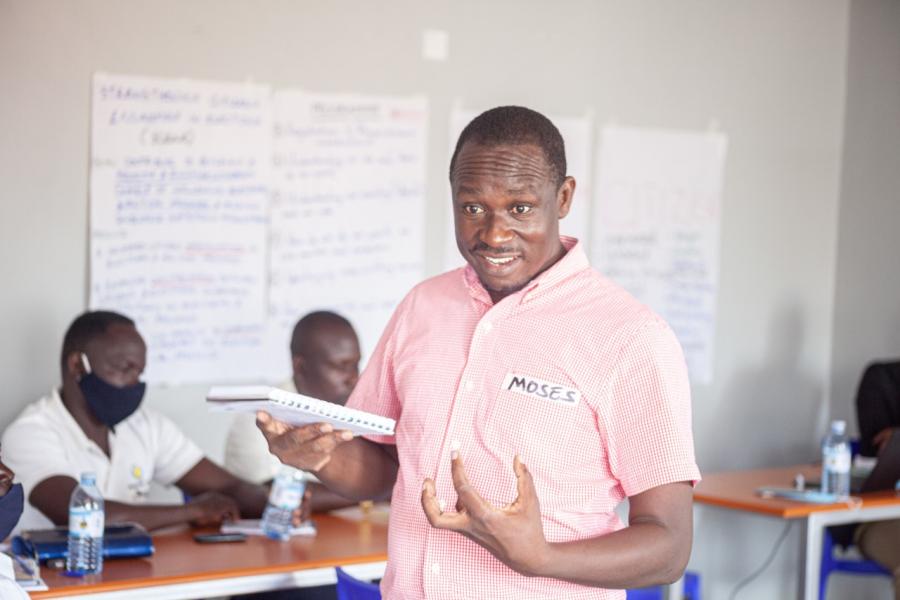
UNNGOF and Partners Train Network of 252 Civic Mentors
Over the past one month, The Uganda National NGO Forum (UNNGOF) and partners under the Strengthening Citizens Engagement in Elections (SCENE) Activity trained a network of 252 civic mentors and Topowa Forum conveners (124 females and 165 males) from across the 14 sub-regions of Uganda.
The civic mentors were purposefully selected based on their track record of civic leadership in their communities. The Civic mentors were equipped with the requisite skills to facilitate and conduct community meetings on electoral and political issues. Hosted in four districts, i.e. Soroti, Jinja, Bushenyi, and Gulu, the trainings fall within the framework of ongoing civil society efforts to build citizens’ resilience and competence to effectively engage in governance processes and hold their leaders accountable.
The newly trained civic mentors will boost the already existing ‘TOPOWA’ and EKYOTO Fireplace engagement models that have proved effective in igniting citizens’ debate around topics that are pertinent to their rights, livelihoods, and community development. It is expected that 126 informal citizens’ formations and over 50,000 citizens will directly be engaged in these conversations throughout 6 months.
The forums will not only act as grounds for conscientising citizens on their political and civic rights but also enable them to organise themselves to take action and demand accountability from their leaders. Topics to be discussed will range from issues affecting their communities, national development, elections, and electoral processes, political and electoral reforms, among others. The recently concluded elections, for instance, will be a major point of reflection. The meetings will also provide an opportunity for citizens to follow up on promises made by political leaders during campaigns and to sustain their engagement beyond the boom-and-bust moments of euphoric election events and activities.
During the trainings, the participants explored and discussed the history of Uganda and democratic principles, key trends in Uganda’s nation-building efforts since independence, key pillars of democratic governance, and duties of citizens. The plenary discussions were also quite revealing as participants explored the key issues that characterise the current governance context in Uganda.
For most participants, these trainings also provided an opportunity to reflect on their duties and responsibilities as citizens of Uganda. In Jinja, for example, Mr Tenywa Arajab learned the imperative of participating in the electoral processes; “I have learned that casting my vote during elections gives me the moral authority ‘as a citizen to hold political leaders accountable”.
Another participant, Mr Wilson Kirunze said, “In the last election, I only voted for President because I didn’t appreciate the value of voting for local councillors. This training has helped me understand that the local council positions are equally important.’’
“For me, this training is a reminder that I don’t have to be a politician to participate in political activities,” says Ms Amongin Christine from Soroti. She also added that it is her mandate as a citizen to monitor the work of elected leaders and civil servants in her community.
The sessions also focused on explaining the basis of the community engagement model adopted by the SCENE activity and how the civic mentors are expected to execute their work. Referring to the TOPOWA Charter, the facilitators underscored the importance of using participatory methods that are effective in prompting citizens to reflect and analyse their own experiences.
Using role-plays and interactive sessions, the participants demonstrated how to engage citizens using the ‘questioning approach’ and the principles of participatory engagement during community meetings. The participants were also trained on how to manage dissent and diversity, how to ensure effective participation and involvement of marginalised and excluded groups.
It is expected that the civic mentors will commence their activities with reflections on the “election that was” – a citizens’ mini-audit of the 2021 electoral process scheduled for May. The outcomes of these meetings will feed into the election stakeholder meetings at the district level.
These activities are part of the Strengthening Citizens’ Engagement in Elections (SCENE) Activity which is jointly coordinated by the Uganda National NGO Forum (UNNGOF), the Forum for Women in Democracy (FOWODE), and a network of 14 regional implementing partners. SCENE is supported by the United States Agency for International Development (USAID).



